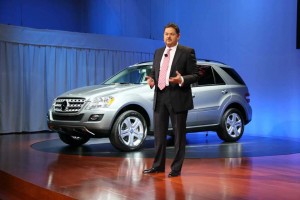In a striking and unexpected move Daimler AG has announced that Ernst Lieb has been relieved of his duties as CEO of the maker’s Mercedes-Benz USA operations effective immediately.
The move took even well-placed insiders by surprise, triggering a variety of rumors about the well-liked executives sudden departure. Company officials issued only a terse formal statement noting, “Ernst Lieb has been excused from his duties as CEO of Mercedes-Benz USA (MBUSA), effective immediately. Daily business operations of MBUSA will be conducted by Herbert Werner (CFO and Vice President Finance, Controlling & IT) until further notice.”
The fact that Werner will handle Lieb’s duties on an apparently temporary basis underscores the apparent suddenness of the shake-up.
“I don’t understand this. It had to be something personal considering they’re gaining share and improving sales,” said analyst Joe Phillippi, of AutoTrends Consulting.
Since taking the helm at Mercedes-Benz USA, Lieb has overseen steady growth. Mercedes sales are up 10.4% for the year, well ahead of the overall U.S. automotive market’s slow revival. The maker is now the leading luxury brand in the U.S. – pushing past Toyota’s Lexus division which has suffered serious product shortages as a result of Japan’s March 11 earthquake and tsunami.
When Lieb was named president and CEO it ranked third in the U.S. market and had already begun nudging Lexus even before the March disaster struck.
The 56-year-old Lieb was a Mercedes lifer, joining parent Daimler AG – then known as Daimler-Benz AG – in 1976 as a spare parts specialist. He was assigned to North America several times during his 36-year career, including a stint as CEO of Mercedes-Benz Canada in 1995. He was serving as head of DaimlerChrysler’s Australian and Pacific Operations in 2003.
Lieb was often credited with helping Mercedes improve its quality and customer service, pushing the maker to focus on the distinct needs of the Canadian and, more recently, the U.S. market.
He liked to tell the story of how the maker was routinely dinged in Canadian quality surveys because of the frequent failures of its alternators. The problem, he noted, was that Daimler engineers didn’t recognize the higher loads placed on the electrical systems in Mercedes products due to that country’s cold winters. When Lieb finally was able to get the components changed the company’s quality scores rose quickly. Under his guidance Mercedes had similar results in the U.S.
He was particularly well-liked by dealers – and successful at convincing them to invest more than $1 billion in recent years to upgrade their showrooms.

